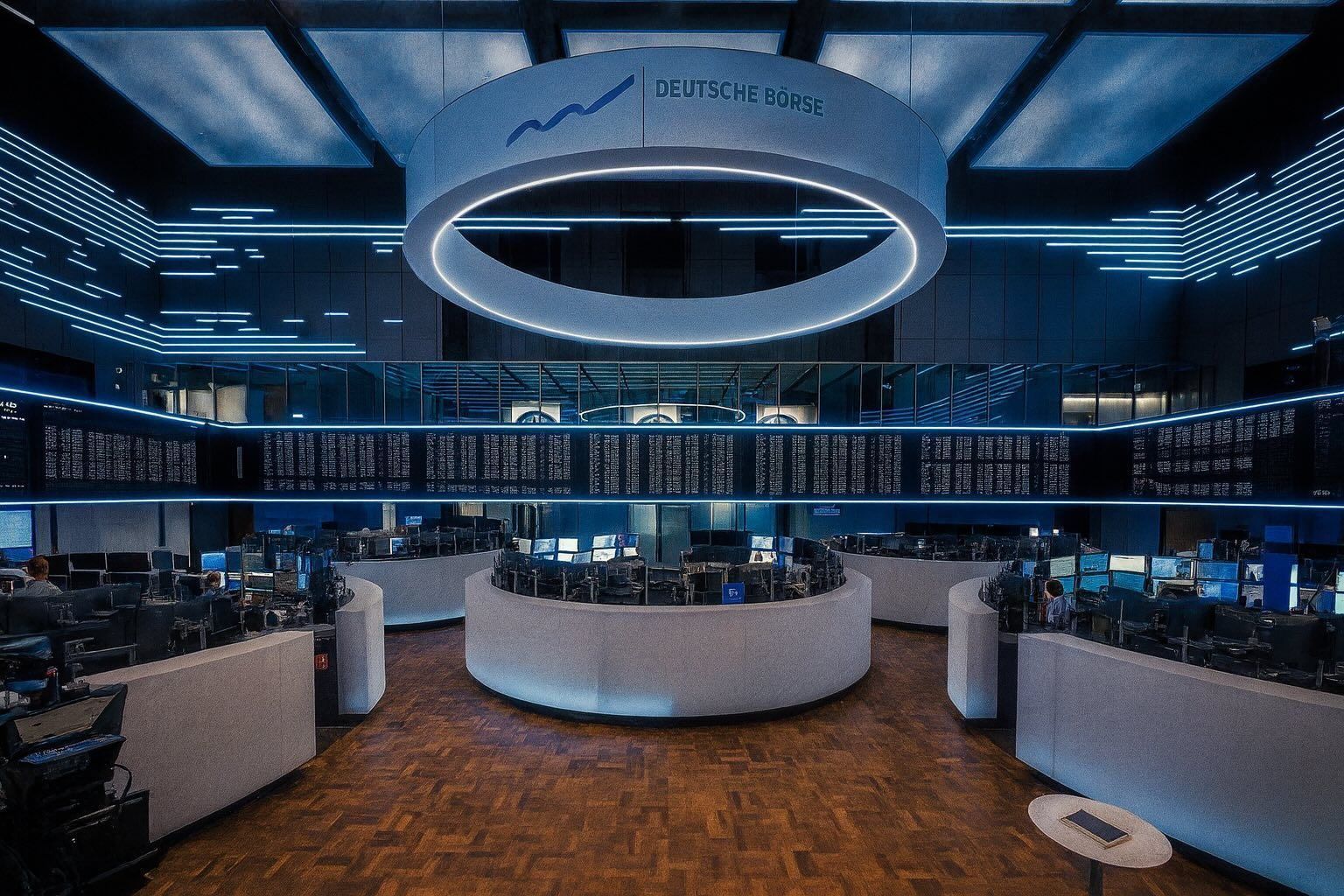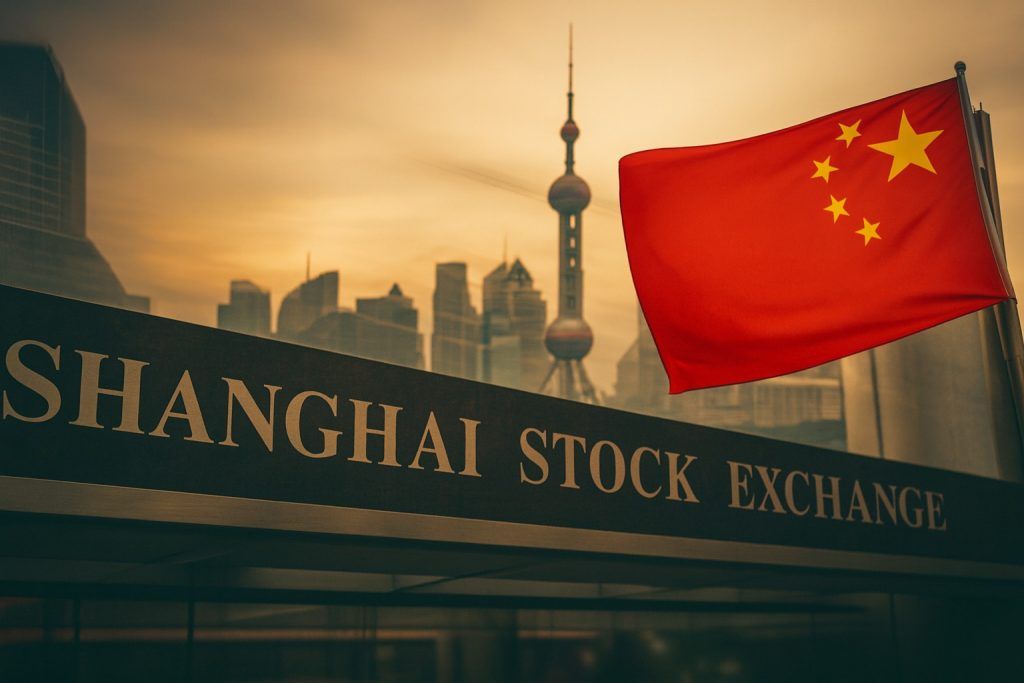Germany’s stock market is under pressure today, Friday 21 November 2025, as the DAX 40 retreats from recent highs in a broad risk‑off move driven by global tech volatility, softer German business data and a sharp sell‑off in defence names.
Below is a full same‑day wrap of the Germany stock market today, suitable for Google News and Discover, with all key moves and drivers from 21.11.2025.
Key takeaways for Germany stock market today (21 November 2025)
- DAX 40 down around 1% intraday, trading near the 23,000–23,300 zone after early drops of about 1.1–1.2%, following a sharp reversal in global tech stocks and renewed worries over a potential “AI bubble” and a hawkish US Federal Reserve. 1
- Index still below key moving averages, with technical analysts flagging resistance around 23,400–23,500 and support just above the 23,000 mark. 2
- Defence stocks lead declines: Germany’s Renk falls roughly 6%, while Hensoldt and Rheinmetall slide about 4%, after Ukrainian President Volodymyr Zelenskiy signalled willingness to work on a US‑backed peace plan, triggering a sector‑wide sell‑off in European arms makers. 3
- Siemens Energy tumbles around 7% after hitting a record high on Thursday, as investors lock in gains following a massive year‑to‑date rally and digest plans for a share buyback of up to €6 billion through 2028. 4
- Selected mid‑caps buck the trend: CTS Eventim jumps about 6–7% on strong Q3 results and a CFO appointment, helping the MDAX hold up slightly better than the blue‑chip benchmark. 5
- Macro backdrop turns cloudier: Flash PMI data show German business activity growth cooling in November, with manufacturing sliding deeper into contraction and services losing momentum. 6
- Bond yields broadly stable: The 10‑year German Bund yield is hovering close to 2.7%, signalling no major flight to safety despite equity volatility. 7
DAX 40 retreats towards 23,000 as global tech sell‑off hits Frankfurt
After a relatively upbeat session on Thursday – when the DAX 40 closed about 0.5% higher at 23,278.85 points – the mood flipped sharply overnight. 8
By mid‑morning on Friday, Germany’s benchmark DAX 40 was down roughly 1.1–1.2%, hitting its lowest level since early May and trading close to the psychological 23,000‑point threshold. 1
A combination of factors is weighing on sentiment in the Germany stock market today:
- A renewed global tech rout, following a violent swing in US mega‑cap technology names after Nvidia’s latest results initially sparked a short‑lived rally. 9
- Concerns that equity valuations in AI‑linked stocks have overshot fundamentals, increasing chatter about a potential “AI bubble”. 1
- A mixed US jobs report and hawkish commentary that leave the Federal Reserve’s December policy meeting finely balanced, keeping rate‑cut expectations in check and risk appetite fragile. 1
Intraday, market data indicate that Germany’s main stock index (DE40/DAX) is trading more than 1% lower near the 23,000 mark, in line with losses across other major European benchmarks. 10
From a technical perspective, German commentary highlights:
- The DAX struggling below its 200‑day moving average, currently just above 23,400 points.
- Key resistance zones outlined around 23,350–23,700 and 24,000 points, with downside supports near 23,150, 23,000 and 22,750 points. 2
That combination of weaker global risk sentiment and a technically fragile setup is keeping short‑term traders cautious and making fresh highs unlikely in the near term.
Defence stocks drag the DAX as Ukraine peace hopes hit sector
One of the most important stories in the Germany stock market today is the sudden reversal in defence shares, which have been among the strongest performers since the start of the war in Ukraine.
A Reuters report shows that an index of European aerospace and defence stocks is down about 2.6%, falling to its lowest levels since early September. The move was triggered after Ukrainian President Volodymyr Zelenskiy said he was ready for “honest” work on a US‑backed plan to end the war, prompting investors to reassess the outlook for defence spending. 3
Within that index, several German names are under heavy pressure:
- Renk – a key supplier of military transmissions and drive systems – is down around 6%, heading for a sixth consecutive session of losses. 3
- Hensoldt and Rheinmetall, two other major German defence contractors, are both lower by roughly 4% intraday. 3
These stocks have been huge winners over the last three years, with the European defence index up more than 200% since early 2022, as governments across the continent ramped up military spending. 3
Interestingly, JPMorgan analysts still see the pullback as a potential buying opportunity, arguing that any peace proposal that would be seen as a de facto victory for Russia could actually force European defence budgets even higher and faster than currently planned. 3
For the DAX and broader German stock market today, however, defence is clearly a drag, adding to pressure on the index at a time when tech‑related names are already wobbling.
Siemens Energy: from record high to worst day since April
Another big talking point in the Germany stock market today is Siemens Energy.
After a spectacular run fuelled by improving fundamentals and enthusiasm around its “AI turn” and grid‑related investments, shares in Siemens Energy hit a record high on Thursday. 4
Less than 24 hours later:
- A Reuters‑based note via TradingView reports that Siemens Energy shares are down about 7%, on track for their worst single day since April. 4
- A trader cited in the report suggests there is “no more positive news” left to price in immediately after the company’s capital markets day and strong run‑up, indicating classic profit‑taking behaviour. 4
At the same time, the company itself announced plans to repurchase up to €6 billion of its own shares by the end of fiscal 2028, a move that underlines management’s confidence in long‑term prospects but also raises questions about valuation after the recent rally. 11
For the DAX 40, Siemens Energy had been one of the bright spots of 2025. Today, its pullback is one of the single largest negative contributions to the index, reinforcing the theme of high‑beta winners being sold first as volatility returns.
Mid‑caps diverge: CTS Eventim rallies on strong Q3
While the headline indices are under pressure, not all of Germany’s stock market is red today.
A notable outperformer is CTS Eventim, the Frankfurt‑listed ticketing and live entertainment group:
- Shares in CTS Eventim are up about 6.6% after the company reported robust Q3 results and announced the appointment of a new chief financial officer.
- According to J.P. Morgan, Eventim’s adjusted EBITDA beat consensus by roughly 5%, with analysts highlighting “steady” revenue momentum despite a challenging macro backdrop. 5
CTS Eventim is part of the MDAX, the mid‑cap index that often behaves differently from the blue‑chip DAX. Today’s move underscores how stock‑specific earnings stories can still generate strong gains, even when the broader Germany stock market today is dominated by macro and sectoral headwinds.
Macro backdrop: German PMI survey shows momentum fading
Beyond the day‑to‑day market swings, fresh economic data released today are feeding into the cautious tone.
The flash Purchasing Managers’ Index (PMI) for November from Hamburg Commercial Bank (HCOB) and S&P Global indicates that:
- The German composite PMI (covering manufacturing and services) fell from 53.9 in October to 52.1 in November, a two‑month low – still in expansion territory (>50), but clearly slower.
- Manufacturing PMI dropped to 48.4, deeper into contraction, against forecasts for a small improvement.
- Services PMI eased to 52.7 from 54.6, also below expectations. 6
Economists quoted in the report describe the data as a “major setback”, warning that:
- Hopes for a re‑acceleration in services have “vanished”, and
- Overall, the German economy is “limping towards marginal growth at best” in the fourth quarter. 6
For equity investors looking at the Germany stock market today, this PMI mix is problematic:
- Export‑heavy industrials and capital‑goods manufacturers face weaker new orders and the sharpest decline in export sales since January. 6
- At the same time, services are no longer strong enough to fully offset manufacturing weakness.
The data arrived just as markets were already jittery about US monetary policy and global tech valuations, adding a domestic growth headwind to an already crowded wall of worry.
Bonds, currency and ETFs: the broader German market picture
Bund yields steady around 2.7%
On the fixed‑income side, the 10‑year German Bund yield is roughly 2.7%, little changed on the day. 7
The relative stability in bonds suggests:
- No full‑blown flight to safety, despite the drop in equities.
- Markets see today’s moves more as an equity valuation reset and sector rotation than as the start of a systemic shock.
ETFs and retail flows: Xtrackers’ growth story
A separate piece of news relevant to the German market ecosystem today comes from DWS Group’s Xtrackers ETF platform:
- Xtrackers has helped push DWS assets under management to record highs and is targeting close to $400 billion in ETF assets by year‑end, with strong growth particularly via digital channels and neobroker platforms. 12
- The business is increasingly focused on retail investors in Germany and across Europe, with ETF savings plans gaining traction among German households.
- Xtrackers has also launched thematic products – including a Europe defence technology ETF – which ties directly into today’s volatility in the defence sector. 12
This structural shift matters for the Germany stock market today because it highlights how ETF flows can amplify moves in major sectors like technology and defence, both on the way up and during sharp corrections like today’s session.
How Germany’s session fits into the global market sell‑off
Today’s weakness in the DAX is not happening in isolation. Around the world:
- US indices saw a sharp reversal on Thursday, with the Nasdaq suffering a heavy drop as investors dumped high‑beta tech and AI names. 9
- Asian markets followed with losses overnight, particularly in tech‑heavy benchmarks. 13
- Across Europe this morning, the pan‑European STOXX 600 is down about 1%, its lowest level since early October, and on track for its steepest weekly fall since late March. 1
Within that context, Germany’s DAX 40 is broadly in line with its regional peers, with slightly larger losses because of its:
- High weighting in global industrials and exporters,
- Exposure to cyclical tech and AI‑adjacent names, and
- Heavy defence component, which is taking an extra hit from Ukraine peace headlines.
What investors in the Germany stock market are watching next
Looking ahead from today’s session (21 November 2025), traders and longer‑term investors in the German stock market are focusing on several key questions:
- Will the DAX hold the 23,000 zone?
- This level coincides with important short‑term support. A decisive break below could open the door to a test of the high‑22,000s, while a rebound would support the case for consolidation rather than a deeper correction. 2
- How entrenched is the global tech correction?
- If the AI‑driven sell‑off in US mega‑caps continues, it may keep pressure on German technology‑ and automation‑linked stocks, even those with solid fundamentals.
- Do defence stocks stabilise or extend their slide?
- After an extraordinary multi‑year rally, today’s pullback in Renk, Rheinmetall and Hensoldt could either be a short‑term shake‑out or the start of a longer period of consolidation, depending on how peace‑process headlines evolve. 3
- Can domestic data improve into year‑end?
- The PMI report paints a picture of an economy that is growing, but just barely. Upcoming hard data on industrial production, orders and employment will be crucial in determining whether Germany is heading for a soft landing or stagnation. 6
- What will the Fed and ECB do next?
- Markets are balancing between “higher for longer” rates and the hope that the Fed and ECB will avoid overtightening into a slowdown. For rate‑sensitive sectors on the DAX – such as real estate, banks and growth tech – policy signals over the coming weeks will be key.
Bottom line
The Germany stock market today (21 November 2025) is defined by risk‑off sentiment, a global tech sell‑off, defence sector weakness, and cooling domestic data. The DAX 40 is trading lower by around 1%, hovering near 23,000, with volatility indicators elevated and technicals still fragile.
At the same time, select German mid‑caps like CTS Eventim show that strong earnings can still be rewarded, and structural stories – such as the continued rise of ETF investing through platforms like Xtrackers – are quietly reshaping how capital flows through the Frankfurt market.
As always, this article is for information purposes only and does not constitute investment advice. Investors should consider their own objectives and risk tolerance and, where appropriate, seek professional guidance.






